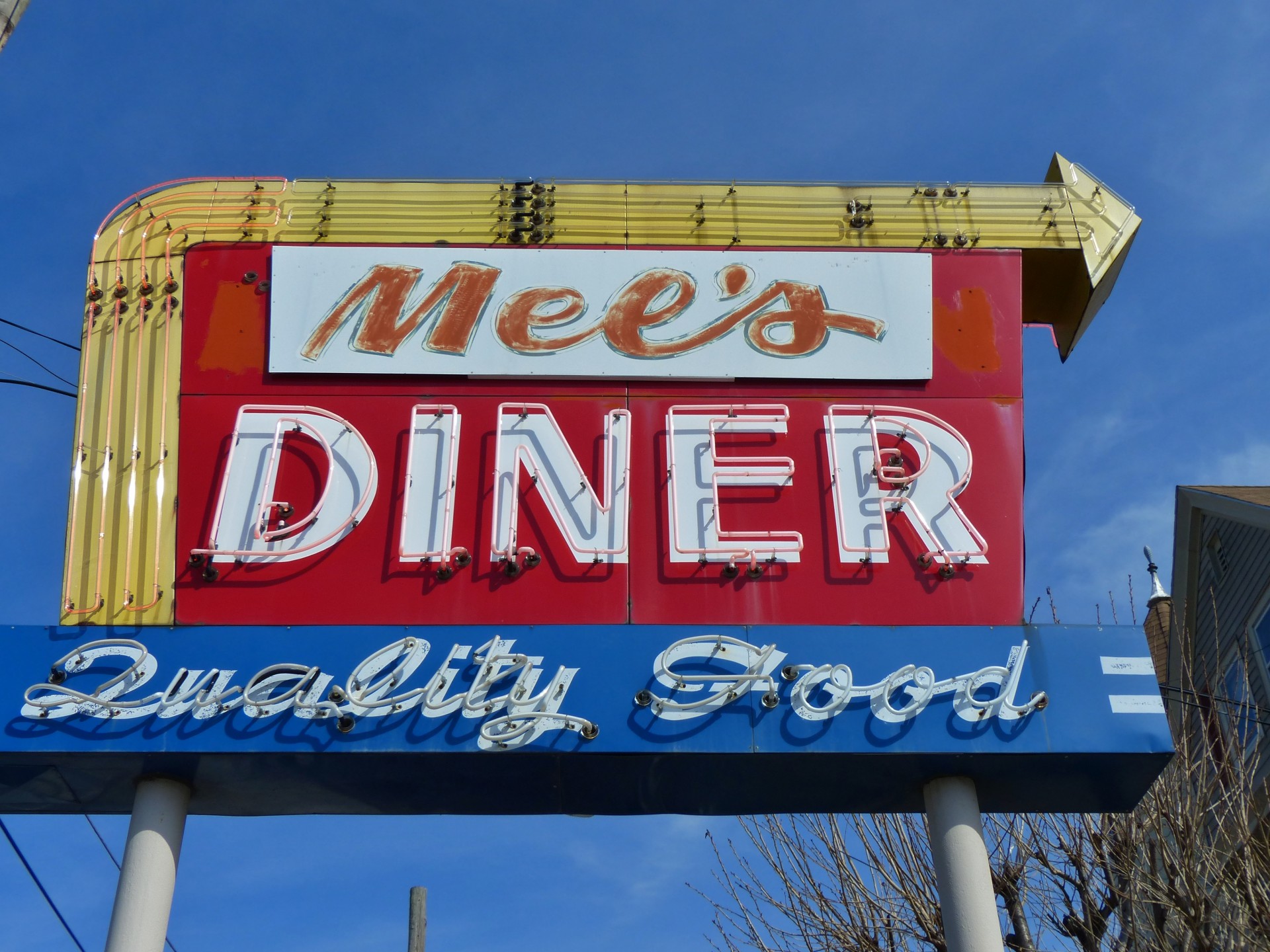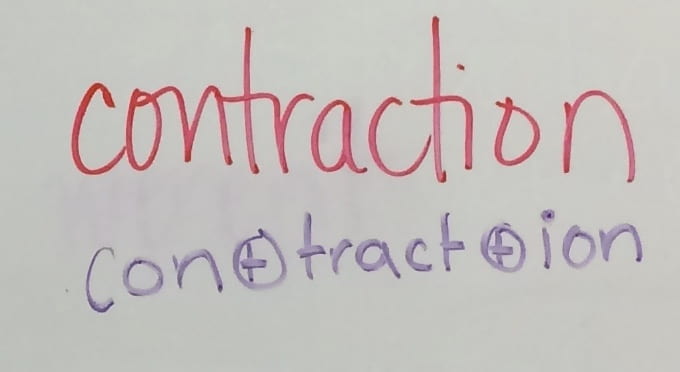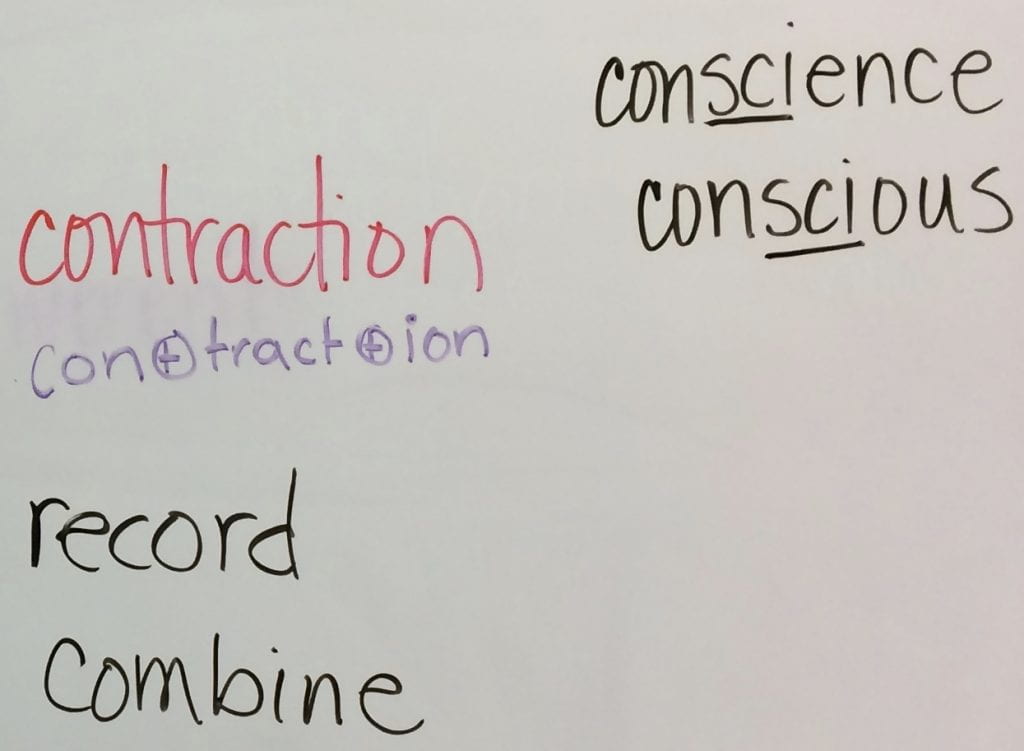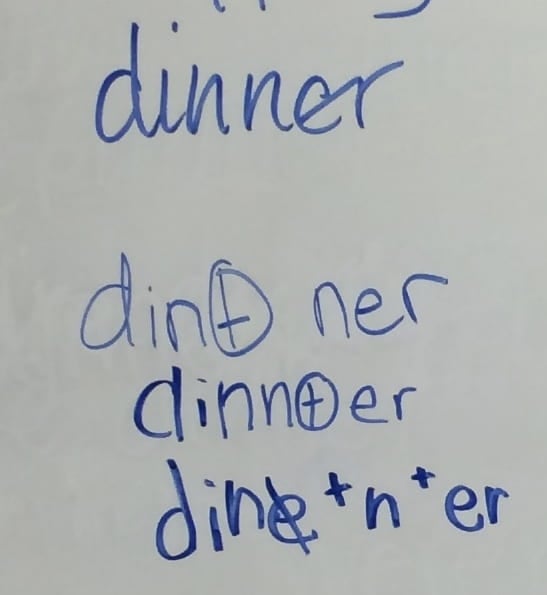
Last week my students wrote poems. As I was editing them, one of the errors I saw over and over was the use of <your> when <you’re> was needed. With a recently viewed meme in mind, I wrote the following on the board:
your dinner
you’re dinner
As the students filed in and sat down, the giggles began. Some recognized right away the meaning difference between these two. I asked for a volunteer to share what “your dinner” means with the whole class. Even though I could tell that many understood what each meant, it was interesting to me that there was some struggle in putting that understanding into words. To say that “your dinner” means “your dinner” isn’t very clear, is it? The understanding is so clear in the student’s mind, that they don’t realize they are not communicating that clarity. The student who was defining “your dinner” went so far as to reach her hands out in front of her as if she was handing me a plate of something.
Such an important reminder! I can never forget that even when I am confident that my students understand something, I must give them lots of opportunities to express that understanding either orally or in writing. Expressing oneself with clarity comes with practice!
I asked if anyone could add words to that explanation that would help. A student said, “It’s not my dinner, it’s yours.” That helped because without using the word, it illustrated that the dinner is in “your” possession. Since we have been identifying parts of speech in sentences lately, I asked what kinds of words both “your” and “dinner” were. This is an understanding that is growing, but not fully there yet for all students, so I called on a student that I knew would be able to answer the question. The student identified “your” as a possessive determiner that is announcing the noun “dinner.” Great! A possessive determiner makes sense because we understand that the dinner belongs to someone and that “dinner” is a noun.
Even more students were excited to explain the meaning of “you’re dinner.” The student I called on said easily that “you’re” is short for “you are” so that this phrase is saying that “you will be eaten for dinner!” Anyone who hadn’t been sure of the difference between these two phrases laughed at this point. Students turned to one another and excitedly imagined telling each other that they were the dinner. When it was time to regain their attention, I asked if anyone knew the word we use to name a word like “you’re.” Several could kind of remember how it started but not the word. So I said, “It’s called a contraction.” Among the “Oh, yeah,” comments that I heard, one student in the front blurted out, “You mean like when someone’s having a baby?” I gave the room full of ten-year-olds a moment to laugh uncomfortably before I replied.
“Well, actually, the sense in both situations isn’t that different.”
“Whaaaa?” More giggles and sounds that expressed disbelief.
“When a momma human or animal is giving birth, the muscles contract to push the baby out. When two words like ‘you’ and ‘are’ contract, the letters push together so intensely that one letter pops out. We mark the missing letter with an apostrophe.”
Next I wrote the word ‘contraction’ on the board and asked for a word sum hypothesis.
Looking over what the student had written, I asked if anyone could offer evidence to support the idea of a <con> prefix. Could anyone think of a word with one?
“Conduct.”
“Contradict.”
“Confess.”
“Convict.”
“Confident.”
And then someone said, “Contract,” and when he did, one student made a funny face. So I asked if contract was a familiar word. Yes, it was. What does it mean if you sign a contract with someone else? A student replied that it meant there was an agreement between the two people. Great. Now I looked back for the quizzical look I saw a few minutes ago. I asked what the student was thinking. She said, “I was thinking of ‘contract’.” And as she said it I realized that she was putting the stress on the base <tract> instead of the prefix <con>. What a delightful detour this would be!
So we talked about contracting a cold or a disease and how that was an action verb. But when the stress was on the prefix <con>, the word was a noun. We could say that for sure because we could use the indefinite article ‘a’ in front of it. We could talk about a contract.
Because I didn’t want to leave the topic without a few more examples, I wrote two more words on the board that could likewise be read as a noun and a verb, depending on the stress placement.
With ‘record’, the students thought of the verb first with the stress on <cord>. So I let them practice shifting that stress to then recognize the noun ‘record’ which might refer to the time to beat in a race (I want to beat my record of 22 minutes!). I chose ‘combine’ on purpose. I have several students who live on farms. Those were the hands that popped up first on this one. “A combine (stress on the prefix) is a machine used on a farm. It is a noun.”
And, this being such a commonly used verb, most everyone was able to shift the stress to the base <bine> to read the verb “combine.” Several gave examples of how it might be used in a sentence.
Then the very best question came from a student. “If these words look the same, how do you know whether it’s being a noun or a verb?” I thanked this student for giving us one more glorious opportunity to reinforce an important concept. It is how the word is functioning within the sentence. We have to look at where it is in the sentence and how it is functioning to know. Seeing as the next item on our agenda for the day was grammar, I was particularly happy about setting the grammar lesson up in this way!
I was ready to get back to looking at the word sum for <contraction>, when I saw a hand waving in the air. It belonged to someone who is less apt to contribute in class, so I called on him. “What about ‘conscience?’ Does that have a <con> prefix?” I love talking about this word and in particular the base of this word <sci>. The pronunciation is so different in members of its word family, that if you only hear the words conscience, conscious, and science, you might not realize that they even are the same base.
We have talked before about the structure of <science> being <sci + ence> and the base <sci> having a denotation of “know.” So I applied that to <conscience>. Your conscience is that part of you that knows right from wrong. When we say, “Let your conscience be your guide,” it means to rely on those inner feelings that tell you which is a right choice and which is a wrong choice. Then you will know what to do. And then, of course, there is the word <conscious>. When you are conscious, you know what is happening around you. When you are unconscious, you do not! Now back to the word sum for <contraction>.
I stated that we had just come up with a lot of evidence to show that <con> is a prefix in a lot of words, so it is quite plausible to think it might be a prefix in <contraction> as well. Next it was time to think about the next element in the hypothesis, <tract>. I asked if anyone could think of a word with <tract> in it.
“Tractor.”
“Traction.”
“Subtract.”
“Abstract.”
Since I hadn’t even gotten to the word I wanted to investigate with them yet, I told them what I knew about this base. (As opposed to looking it up at Etymonline with them.) There are so many side trails we could take with initial questions like this one, that I need to balance when I share my understanding and when I have them dig for the understanding. It has to do with how engaged they are and how long I predict that engagement will last.
I told them that the base <tract> has a denotation of “draw or pull.” Then I asked, “Does a tractor have anything to do with drawing or pulling?” They all nodded yes. “What if your boots have traction on the ice?” Again, they agreed that it would pull on the ice instead of sliding. “When you subtract numbers, is there a sense of pulling down or drawing from the first number and taking some away?” Yes, they could imagine that. “And when we think of abstract nouns, aren’t we thinking of the nouns that aren’t concrete? The ones that have been withdrawn from the concrete nouns? The ones that are separate from material objects such as your chair, desk, and pencil?”
They could see it, but we talked about that denotation being strongest in the words ‘tractor’ and ‘traction’. They had more of a physical sense of pulling and drawing whereas subtract and abstract were more of a mental image of pulling rather than that physical action.
So in the end, it was decided that our word sum hypothesis could make sense based on the fact that we recognized both <con> as a prefix and <tract> as a base. We had already talked about the word <contract>, so we knew that <ion> was a suffix in this word. Now on to the really interesting question for the day!
I asked if anyone had a word sum hypothesis for the word ‘dinner’. As soon as I asked it, I turned to the class and rather excitedly said, “I’ve never thought about where this word comes from or what its word sum will be. We will be learning about it together!” Below is a picture of some of their hypotheses.
There was one more word sum that is not on the list above. It was <di + nn + er>.
When we began the conversation about these four possibilities, we noticed that three of them had an <er> suffix. We brainstormed a few words with a clear suffix and decided that an <er> suffix was plausible. then we looked at the other identified elements. Looking at the first hypothesis, I asked if anyone knew the word <din>. They did not. I explained that a din is an ongoing noise. I could say that there was quite a din coming from the indoor recess area. So then I wondered aloud if at dinner the participants were creating a din. Hmmm. The students thought that perhaps sometimes that is the case, but not always. We thought that if the base was <din>, then we could imagine the <n> doubling when the <er> suffix was added.
The second hypothesis (<dinn + er>) was similar to the first. The base is still listed as <dinn>, although unless this is an alternant spelling to <din>, this might be a different base or it might not be a base at all.
The third hypothesis (<dine/ + n + er>) was interesting too. It put the related word <dine> in our minds. It makes sense to think of dinner as being that time when we dine. But it didn’t take long for someone to point out that we wouldn’t replace the single final non-syllabic <e> with a consonant. Good point. If the second <n> wasn’t part of this, it would be a solid hypothesis for <diner>!
When we got to the fourth hypothesis (<di + nn + er>), I modeled giving it every consideration even though in my own head I had doubts. The students did not recognize <di> as a prefix, nor <nn> as a base. So offhand, we could not think of much evidence to support this one.
We were now at that point where we needed a reliable etymological resource. I pulled up Etymonline on the Smartboard.
There were a lot of interesting things in this entry. First off we talked about how old this word was and that in the 1300’s it was used to mean “the first big meal of the day.” Right away the students blurted that it is no longer the first big meal of the day. As we read through the entry, we noticed that earlier than the 1300’s, this word was from the Old French disner “breakfast.” When we go to the recontructed stem of Gallo-Roman (*desjunare) with a meaning of “to break one’s fast,” we paused to think about what that meant. There were a few students aware that the word breakfast meant to break one’s fast. There were also a few who did not know what a fast was. I explained that if their last meal was the night before, they fasted while they were asleep which means they did not eat while they were asleep. Once they started eating their next meal (breakfast) they were breaking the fasting they were doing while sleeping!
The very next thing in the entry indicated that the reconstructed *desjunare was from the reconstructed Vulgar Latin *disjejunare. Here’s where it gets especially interesting. The reconstructed Vulgar Latin *disjejunare is from <dis> “do the opposite of” and Late Latin jejunare “to fast. Wow. So the word <dinner> is from a Vulgar Latin word that means “the opposite of fasting.” We had to say this a few times out loud. “To fast is not to eat. And the word dinner derives from a word that means the opposite of not eating which means, of course, eating!
Since both *desjunare and *disjejunare are reconstructed, I didn’t feel as if we had evidence to say that in Modern English we could support a word sum like <di + nn + er>, but we could sure see the story of this word’s spelling in the history! The prefix in <di> could definitely be an assimilated form of <dis>, and the <nn> could be representing <jejune> although I need to know more before I say that with any authority. I left it like this with the students. We are calling <dinner> a free base with the understanding that its literal meaning is to do the opposite of fasting. We feel that it is strongly related to <diner>, but the two would not be on the same matrix.
We also talked about how dinner used to name the noonday meal and that it gradually shifted to later and later in the day. I told them that when I was a little girl, my lunch time meal was called dinner and the evening meal was known as supper. These days we think of dinner as our evening meal and lunch as, well, lunch! As for supper, Etymonline says it is from Old French soper “evening meal.” We may use dinner and supper interchangeably these days to refer to the last meal before bedtime, but as we have shown, they are not synonyms! They have different meanings and stories!
Further down in the entry was this information:
Dinner-time is attested from late 14c.; dinner-hour is from 1750. Dinner-table is from 1784; dinner-jacket from 1852; dinner-party by 1780. Childish reduplication din-din is attested from 1905.
It was interesting to follow this list of extended uses for dinner and the years in which those uses were recorded. What’s funny to me is that when I think of a dinner-jacket, I think of James Bond. What was funny to the children was the use of “din-din.”
At the end of the day after the students were gone, my mind couldn’t stop thinking about the word sum hypothesis with the <di> prefix. Was there evidence at the Oxford English Dictionary that would help me further? Interestingly enough, the etymology information for <dinner> linked me to the etymology information for <diner>!
Diner:
We see some of the same information here that we saw at Etymonline in the entry for <dinner>. The smaller print says that disner contains the same elements ultimately as French déjeuner, Old French desjuner and owes its greater phonetic reduction to its belonging to an earlier period. So the spelling reflects a phonetic reduction from one of the French spellings or perhaps from one of the late Latin reconstructed spellings. My uncertainty about the direct path the spelling took is what I have based my decision on when I leave <dinner> as a free base. Perhaps someone reading this will be able to direct me to another resource or have a deeper understanding of what I can learn from the OED entry. Until then, I will only go as far in my analysis as I have evidence for.
This is the kind of teaching and learning I love. The students find it interesting and are drawn in as participants in the critical thinking that is going on. They are thinking carefully and learning what it means to “provide evidence in support of a hypothesis.” Every time we read an etymological resource together, they understand how to better use the information offered there. When I can, I point out a connection to some aspect of grammar that we are learning. At the end of the day I was able to send them home and tell them to have a good din-din … especially if they were lucky enough to be having their dinner in a diner!







